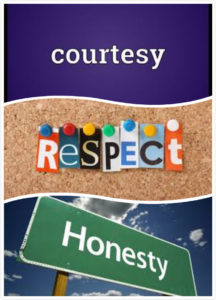 I thought I would share some comments on a topic that is often discussed whenever we see, hear, or read about politicians in the news. What’s important to remember is that you always convey your thoughts with respect, courtesy, and honesty, no matter the subject, and no matter where you live in the world.
I thought I would share some comments on a topic that is often discussed whenever we see, hear, or read about politicians in the news. What’s important to remember is that you always convey your thoughts with respect, courtesy, and honesty, no matter the subject, and no matter where you live in the world.
That said, people also ask me whether our candidates are being “politically correct” (PC) in what they say and how they say it. First, let’s look at the definitions:
Merriam Webster defines PC as, “agreeing with the idea that people should be careful to not use language or behave in a way that could offend a particular group of people.”
Wikipedia states: “Political correctness means using words or behavior which will not offend any group of people. Most people think it is important for everyone to be treated equally, fairly and with dignity. Some words have been used for a long time that are unkind to some people. Sometimes these words have now been replaced by other words that are not offensive. Such words are described as politically correct. The term is often used in a mocking sense when attempts at avoiding offense are seen to go too far.” For additional details, see https://simple.wikipedia.org/wiki/Political_correctness.
To me, being PC means people often shape their views, words and actions not according to their actual beliefs. Instead, they wish to avoid offending or criticizing someone who may be disadvantaged or discriminated against. Therefore, I don’t believe in being politically correct, in the deepest sense of the term. Instead, what I aspire to is conveying my thoughts with the utmost respect, courtesy, and honesty… which often the most honest thing to do is to say nothing, rather than get into a situation where words are exchanged that are not respectful or courteous, regardless of how honest they may be. (As in: If you don’t have any thing nice to say, don’t say it at all.) When people adhere to these three truths, they speak with dignity and honor. This is especially true when the words are supported by facts, not speculations.
Here are three “old school” guidelines to keep in mind, especially in the heat of the recent debates:
- Think first before you speak. It takes but a split second to consider your words first, and whether to say them aloud. Make this reflection a habit.
- It’s not what you say, but how you say it that counts. There will always be a positive and negative way to say something. Choose positive words that will not offend and antagonize someone, yet still get your point across in an honest way.
- Speak unto others as you would have them speak unto you. This is simplest yet hardest lesson to learn. Listen to yourself regularly to hear how you might sound to others. Are your words being heard and are they received well? If not, rewind your memories to replay what transpired. Think through how you could have used the above three guidelines to have that conversation turn out better.
None of these guidelines will work without a conscious decision to think positively, however. Positive thoughts lead naturally to eliminating thoughts, words, and speech people find offensive and demeaning. Once you allow negativity into your brain, your thoughts, words and behavior will naturally come out negatively.
I often quote this poem in my presentations. I believe in it with all my heart:
Watch your thoughts; they become words.
Watch your words; they become actions.
Watch your actions; they become habits.
Watch your habits; they become character.
Watch your character, it becomes your destiny.
—Author Unknown
So the next time you see politicians speaking to each other in insulting and demeaning ways, remember that they have decided not to think positively about the other. You can do better in whatever situation you encounter and in so doing will display appropriate behavior for any situation, anywhere in the world..
Homework: Try to catch yourself conveying thoughts in a negative manner, and turn your words and tone around. If your words happened in the past, analyze the circumstances or reasons for your negative behavior. Once you identify the root cause, you will be on the path to being honest with yourself and the other person. You’ll be able to turn the situation into a positive learning experience, all the while keeping in mind to maintain courtesy, respect, and honesty.
Happy Practicing!
